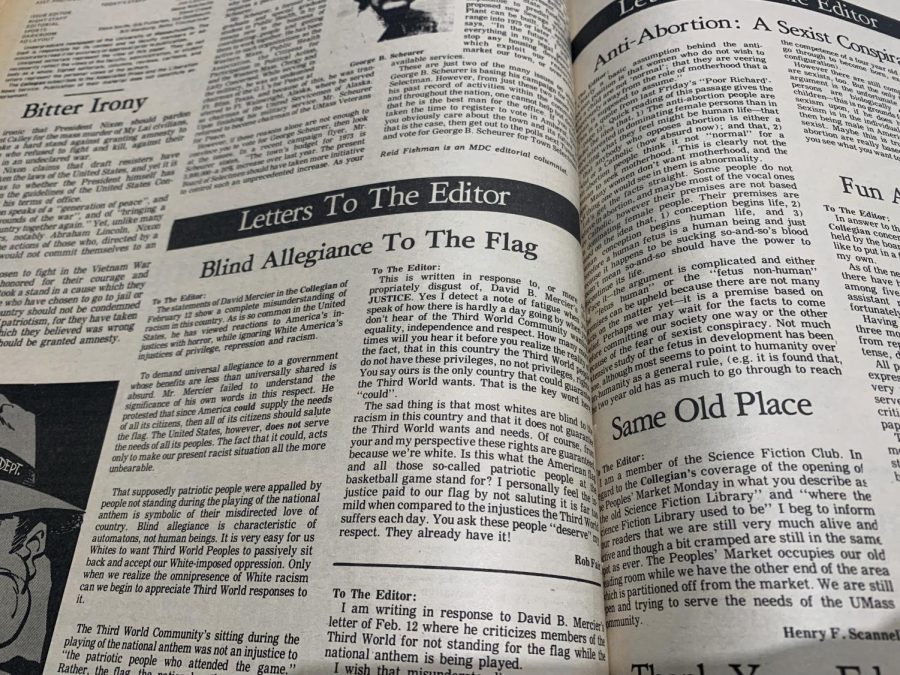On Valentine’s Day 1973, the Massachusetts Daily Collegian published 11 letters to the editor — short messages from students and employees of the University of Massachusetts Amherst commenting on the week’s hottest topics.
Looking back, students nearly 50 years ago were engaged in eerily similar issues as we are today. Is it “unpatriotic” to refuse to stand for the national anthem? Should marijuana be decriminalized? Are anti-abortion activists more concerned with policing pregnancy than fetal development? The big questions never quite go away.
In 1973, George R. Nicholson asked, “does this country really guarantee [equality, independence, and respect] to everyone, or are these rights restricted to certain groups of people?” Today, we know the answer, but we can’t stop asking until there’s a solution.
Others, like a group of roommates complaining of a cold dorm room, were personal with their letters, addressing individual yet universally experienced problems. A member of the Science Fiction Club wrote in too. They reminded students that although a new co-op, People’s Market, moved into their space, the Science Fiction Club thrived in a new location.
The Collegian isn’t the same today, not only due to the death of printed letters to the editor pages, but also for a lack of engaged responses to campus issues.
The near-complete halt of letters to the editor at the Collegian shouldn’t be a surprise. Where students of the past might’ve written a response to something they saw in the paper that morning, students today react instantly on social media. News travels quickly, and stories that could have been critiqued across print editions are instead chewed up and spit out of the online discourse machine, before details are ever confirmed.
Submitting a letter to the editor isn’t difficult, but it’s certainly more work than penning a half-hearted, poorly worded tweet. By the time you’ve collected your thoughts, it’s easy to feel like everyone else moved on — but it doesn’t have to be that way.
Writing a letter is an opportunity to slow down, think critically and take ownership over your opinions. It’s a chance to respond to the Collegian directly and critique specific flaws in news coverage and framing.
Debating campus issues, though divisive, is the only way to better understand one another. Whether you’re a member of the Student Government Association or angry with one of its decisions, a student or an administrator, your thoughts are an important addition to a broader understanding of the UMass community.
Letters are a little old fashioned, but that’s cool, right? If you’re a UMass student, alum, faculty member or organization, we want to hear from you.
Most importantly, here’s how — letters to the editor submitted to the Collegian must be fewer than 750 words, attributed to an author or organization and emailed to [email protected]. Letters should be written in response to news stories or columns published in the Collegian or under-reported issues in the UMass or Amherst communities. Keep it tight. Think about why you’re the right person to respond and what your voice is adding to the conversation.
A letter to the editor isn’t going to change the world. It won’t make everything right on campus or resolve the hurt caused by an unthoughtful opinion. But it might inspire someone to see things a little differently, and that’s a pretty good place to start.
So this semester, speak your mind, and hold us accountable. UMass will be better for it.
Catherine Hurley can be reached at [email protected] and followed on Twitter @cath_hurley.




















